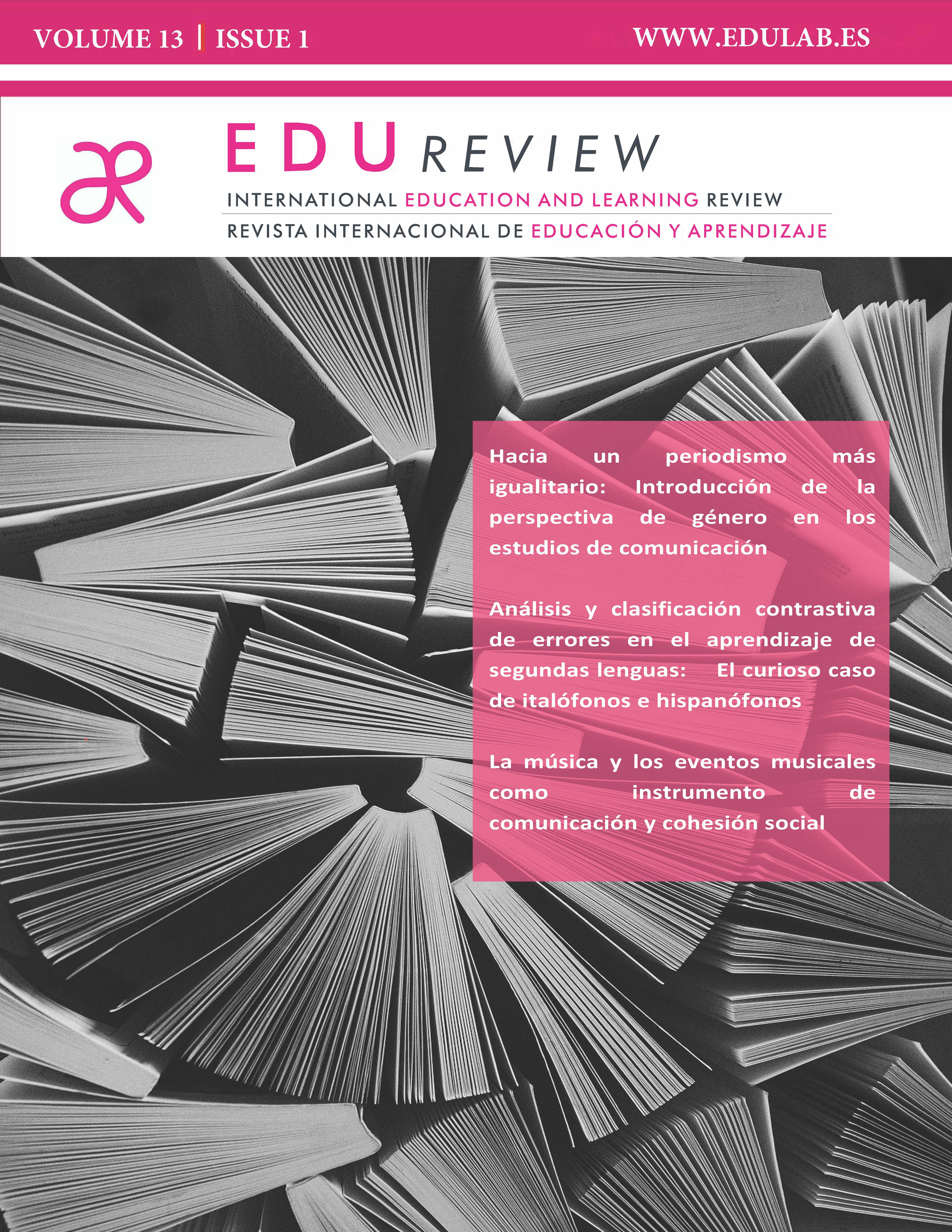Una práctica docente en igualdad de género
Debate periodístico televisivo y su contribución al aprendizaje basado en proyectos y Learning by doing
DOI:
https://doi.org/10.62701/revedu.v13.5447Palabras clave:
Debate, Pensamiento crítico, Responsabilidad Social Universitaria, Metodologías activas, Objetivos de Desarrollo SostenibleResumen
El debate es una herramienta educativa valiosa en el contexto universitario, ya que fomenta el pensamiento crítico, la reflexión y la conexión entre la realidad social y el entorno académico. A través del debate, se desarrollan competencias como la argumentación, la comunicación y el aprendizaje colaborativo. Las universidades deben responder a los desafíos sociales actuales implementando acciones alineadas con la Agenda 2030 y los Objetivos de Desarrollo Sostenible (ODS), promoviendo la Responsabilidad Social Universitaria (RSU) y valores como la igualdad de género. En este marco, las metodologías activas de enseñanza, como el Aprendizaje basado en Proyectos, el Aprendizaje Competencial, el Aprender Haciendo o el Aprendizaje Informal, cobran especial relevancia. Estas estrategias no solo mejoran el proceso de enseñanza-aprendizaje, sino que preparan a los estudiantes para enfrentar retos globales, promoviendo una formación integral y comprometida con una sociedad más equitativa, sostenible y participativa.
Descargas
Estadísticas globales ℹ️
|
305
Visualizaciones
|
148
Descargas
|
|
453
Total
|
|
Citas
ALLEA-All European Academies (2018). Código Europeo de Conducta para la Integridad en la Investigación. ALLEA-All European Academies. https://qrcd.org/3UgC
Asenjo, E., Asensio, M. y Rodríguez-Moneo, M. (2012) Aprendizaje Informal. SIAM. Series Iberoamericanas de Museología.Vol. 2., 39-53 https://repositorio.uam.es/bitstream/handle/10486/11469/57000_3.pdf
Bandera López, N. (2019). Pluralismo político y rol del moderador en tertulias televisivas: Al Rojo Vivo y Las Mañanas de Cuatro. Miguel Hernández Communication Journal, (10), 39-56. DOI: https://doi.org/10.21134/mhcj.v10i0.265
Barrientos-Hernán, E. J., López-Pastor, V. M., y Pérez-Brunicardi, D. (2020). Evaluación Auténtica y Evaluación Orientada al Aprendizaje en Educación Superior. Una Revisión en Bases de Datos Internacionales. Revista Iberoamericana de Evaluación Educativa, 13(2), 67-83. https://doi.org/10.15366/riee2020.13.2.004 DOI: https://doi.org/10.15366/riee2020.13.2.004
Barroso, J. (2008). Realización audiovisual. Síntesis.
Bisquerra Alzina, R. (Coord.) (2019). Metodología de la investigación educativa. Editoral La Muralla.
Cebrián Herreros, M. (1998). Información televisiva. Mediaciones, contenidos, expresión y programación. Síntesis.
Comisión de CRUE Universidades españolas para la Agenda 2030 (2020) Propuestas de acciones de sensibilización para la implementación de la Agenda 2030 e inquietudes de las universidades en relación con el cumplimiento de los ODS. CRUE Universidades españolas. https://qrcd.org/3UUM
Eirín, R., García, H. M. y Montero, L. (2009). Desarrollo profesional y profesionalización docente. Perspectivas y problemas. Profesorado. Revista de Currículum y Formación de Profesorado, 13(2), 1-13. https://revistaseug.ugr.es/index.php/profesorado/article/view/20625
Esteban García, L., y Ortega Gutiérrez, J. (2017). El debate como herramienta de aprendizaje. En VIII Jornada de Innovación e Investigación Docente (pp. 48–56). Universidad de Sevilla.
García Jiménez, J. (1990). Información audiovisual. Los géneros. Paraninfo.
García-Gutiérrez, J. y Corrales Gaitero, C. (2021). Las políticas supranacionales de educación superior ante la “tercera misión” de la Universidad: el caso del aprendizaje-servicio. Revista Española de Educación Comparada, 37 (enero-junio 2021), 256-280 https://doi.org/10.5944/reec.37.2021.27535 DOI: https://doi.org/10.5944/reec.37.2021.27535
Gómez Sánchez, E. (2004). La cortesía lingüística y la negociación de la imagen en las tertulias radiofónicas. En I. Blanco y P. Fernández, El lenguaje radiofónico: la comunicación oral (pp. 169-179). Fragua.
Gutiérrez Lozano, J. F. (2005). La presencia del debate en televisión y su utilidad en la calidad de las programaciones. Comunicar: Revista Científica de Comunicación y Educación, 25(2). https://dialnet.unirioja.es/servlet/articulo?codigo=2927583
Leung, S. O. (2011). A comparison of psychometric properties and normality in 4-, 5-, 6-, and 11-point Likert scales. Journal of Social Service Research, 37(4), 412-421. https://doi.org/10.1080/01488376.2011.580697 DOI: https://doi.org/10.1080/01488376.2011.580697
Martínez-Usarralde, M.J., Gil-Salom, D. y Macías-Mendoza, D. (2019). Revisión sistemática de Responsabilidad Social Universitaria y Aprendizaje Servicio. Análisis para su institucionalización. RMIE [online], 24(80) 149-172. https://dialnet.unirioja.es/servlet/articulo?codigo=6987387
Rodríguez, R. (2012). El debate como estrategia de innovación docente. Experiencias en filosofía del derecho y teoría de la cultura. Revista de Innovación Docente: UPO Innova, (1), 493-503. https://www.upo.es/revistas/index.php/upoinnova/article/view/124/119
Ruiz, G. (2013). La teoría de la experiencia de John Dewey: significación histórica y vigencia en el debate teórico contemporáneo. Foro de Educación, 11(15), 103-124. http://dx.doi.org/10.14516/fde.2013.011.015.005 DOI: https://doi.org/10.14516/fde.2013.011.015.005
Santamaría Suárez, L. (1992). Las tertulias radiofónicas y televisivas, manifestaciones atípicas del periodismo de opinión. Periodística: revista académica, (5), 129-134.
Comunicado de Londres (2007). Hacia el Espacio Europeo de Educación Superior: respondiendo a l los retos del mundo globalizado.[documento en línea].[Sin editor]. http://www.mec.es/universidades/eees/files/2007- comunicadolondres.pdf. Villa, A. y Villa, O. (2007). El aprendizaje basado en competencias y el desarrollo de la dimensión social en las universidades. Educar, 40, 15-48. https://www.redalyc.org/pdf/3421/342130829002.pdf
Descargas
Publicado
Cómo citar
Número
Sección
Licencia
Derechos de autor 2025 Los autores/as conservan los derechos de autor y ceden a la revista el derecho de la primera publicación y el derecho de edición

Esta obra está bajo una licencia internacional Creative Commons Atribución-SinDerivadas 4.0.
Los autores/as que publiquen en esta revista aceptan las siguientes condiciones:
- Los autores/as conservan los derechos de autor.
- Los autores/as ceden a la revista el derecho de la primera publicación. La revista también posee los derechos de edición.
- Todos los contenidos publicados se regulan mediante una Licencia Atribución/Reconocimiento-SinDerivados 4.0 Internacional. Acceda a la versión informativa y texto legal de la licencia. En virtud de ello, se permite a terceros utilizar lo publicado siempre que mencionen la autoría del trabajo y a la primera publicación en esta revista. Si transforma el material, no podrá distribuir el trabajo modificado.
- Los autores/as pueden realizar otros acuerdos contractuales independientes y adicionales para la distribución no exclusiva de la versión del artículo publicado en esta revista (p. ej., incluirlo en un repositorio institucional o publicarlo en un libro) siempre que indiquen claramente que el trabajo se publicó por primera vez en esta revista.
- Se permite y recomienda a los autores/as a publicar su trabajo en Internet (por ejemplo en páginas institucionales o personales), una vez publicado en la revista y citando a la misma ya que puede conducir a intercambios productivos y a una mayor y más rápida difusión del trabajo publicado (vea The Effect of Open Access).













